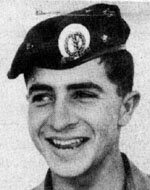Kelly, Benjamin (“Benny”)
Son of Yaakov and Tzipora, members of Kibbutz Tirat Zvi. He was born on the 30th of Elul 5706 (August 30, 1946) in the kibbutz, and when he reached the age of school, he studied at the religious Kibbutz religious elementary school in Sde Eliyahu and completed high school in his 12 grades. He was a good student and interested in nature and organic chemistry, but he loved Bible, history, literature and poetry, but this line of interest stood out when he graduated from high school. He saw himself as a member of Kibbutz Ne’eman and his future path was seen only in the framework of the kibbutz, in which he hoped to fulfill his duties even without the official matriculation certificate. “Elitzur.” The work was discovered and its characteristic characteristics were prominent: Even before his service, the army began to work in the branch and told its members that When he was in the twelfth grade, he took responsibility for the vegetable garden of the children’s company and his organization, and for many hours he devoted himself to the job It. After a while, he guided a children’s group in the kibbutz and afterward went on to instruct (twice a week) at a youth club in the nearby settlement. This he did at his own expense for study and work without anyone asking him for it, because he thought it necessary. At one of the kibbutz children’s camps, he devoted two hours a day to helping a young boy who had difficulty reading – and this was done again. But above all, he showed himself as a dedicated and disciplined soldier when he left for the IDF in November 1965. He enlisted in the Nahal Brigade with his comrades (as part of the cycle of the kibbutzim) and completed a course for a paratrooper unit. The officers demanded that they return to the Paratroopers, that he saw a challenge in the parachute, and again he succeeded, and was now promoted to the rank of lieutenant and discharged from the army. – by nature he was not a sworn militant. But after a while he gave up on the idea because he knew that his kibbutz would not see it favorably and would prefer to exploit his ability to a third year of service within the framework of the movement. His way, in his life in general, was to observe the commandments – and even in military life he was careful not to violate the Sabbath, for example, because of his comfort and pleasure. He did not do things for show, he was serious and quiet with being a cheerful guy with a good sense of humor. He had talents to play a cultural life in society and in addition to his ability to sing, dance and sport, he was an actor all the years, performing at the class and agriculture parties. As soon as the school was over, his class prepared a party for which he wrote all the material, directed the performance – and succeeded. Since then, in the agriculture and within the army and in various courses, he has continued to prepare material, direct it, and organize parties and performances. It should be noted that even though he was a “rugged” kibbutz member, he was also sensitive – and this is evidenced by his love for poetry and his ability to be enthusiastic about poetry. In the army, in cases where his friends fell, he was severely affected. On the fall of his departmental sergeant, for example, he was shaken and excited and could not get away from the shock for a long time. At the outbreak of the Six-Day War he was found to be a junior officer on permanent terms and on the first day of the fighting, on the 26th of Iyar 5727 (June 6, 1967), he fell in a battle at the Rafah junction posts. This happened when he ran with a squad to clear a trench full of Egyptian soldiers and all the squad members were wounded by a grenade thrown at them. Nevertheless, Benjamin continued to run and do his duty because he was dedicated and adhering to his mission, even though the situation of the balance of power was against him. He was buried at the graveThe Military Emergency in Bari, and was later transferred to the eternal rest of the cemetery in Tirat Zvi. After they fell they were promoted to lieutenant. In the “Tirat Zvi” brochure, his name was immortalized. Tirat Zvi published a booklet in his memory entitled “Livni” on the first anniversary of his death. In the book “Ma’alot Giborim”, edited by Israel Erlich, several pages were devoted to stories from his friends, classmates and friends. His memory was raised in articles and articles in several periodicals (such as “Face to Face” and “Bnei Akiva”).
